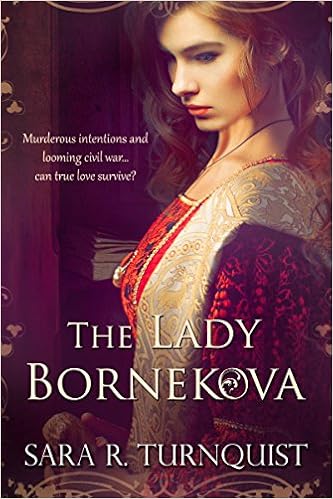Happy New Year, commies!
Today's guest is Sara Turnquist, whose fascinating resume spans zoology to historical literature. Today she joins us to discuss her historical novel The Lady Bornekova set in 15th century Bohemia and the loose boundaries of what is labeled "clean fiction".
MJN: Your novel The Lady Bornekova was
published by Clean Reads. I can see the appeal of a counter-movement to the
"steamy" novels. I know there is a market for Christian novels. I
imagine, not everything that is clean is necessarily Christian. Can you elaborate
on the subtle difference?
ST: A "clean"
novel simply means that it doesn't contain language, gore, "open
door" sex scenes...you know, things that would give it an "R"
rating if it were a movie. A Christian novel is going to have a faith arc in
the story. A character that comes to faith or has a faith story.
MJN: I am of Slavic descent myself, so it was a pleasure to see
a historical novel set in Central Europe, which remains somewhat of an
underexplored frontier. By choosing a locale off the beaten path, an author
takes certain risks but also increases his/her chances of standing out.
ST: That is true. It
was challenging for me to find a lot of research on this specific area/period
in English (and I do not speak/read Czech). But I have visited the Czech
Republic several times and absolutely fell in love with the region and the
culture, becoming fascinated with what history I heard. I visited this
chateau/summer palace and was quite inspired to set a story there.
MJN: What sources did you rely on while doing the research
for The Lady Bornekova? Did you ever run into a situation where
different sources were giving you conflicting information?
ST: As I mentioned, it was difficult to find as
many resources in English as I would have liked. There was definitely
conflicting information and, this being my first novel, I was new to the amount
of research that would be necessary. I relied heavily on the location that
inspired me and the information I gathered while in the Czech Republic (which
was largely told to me by Czech people as there are not many sources there
written in English).
MJN: This is not a criticism by any means, but the blurb
describes Karin, the main character as "strong-willed and
determined". Do you think it's necessary to rely on that language to
connect with your readership? Sometimes I feel like authors, especially
female authors writing about female historical figures, are under pressure to
make that disclaimer, so the readers, God forbid, would not presume the heroine
to be a "damsel in distress". Being strong-willed meant something
different in 1400s.
ST: You make an
interesting point...all of my completed novels (which, this is the first one to
be published) feature a female character as the central main character. I try
to find words that describe them adequately. Of them all, I would say Karin is
the most strong-willed. I wanted to communicate about Karin that she has a mind
of her own and does go against the grain as much as she can for a woman of the
1400s as, you are right, it meant something much different during that time. I
have another novel being published in January 2016 with a female character who
I describe as being "somewhat naive" as she is rather sheltered in
her upbringing and ignorant to the ways of the world. "Strong-willed"
is not a word I would use to describe this character (not to say she doesn't
possess a strength of character all the same).
MJN: The cover has a bit of a Preraphaelite feel to it. Is
it an actual painting or a stock photo made to look like a painting? I
commend you for not cutting the woman's head off, leaving just the lips.
ST: I have gotten so
much positive feedback about the cover. I cannot take much credit for the
artwork. I gave my input, of course, but the graphic artist, Cora Graphics, who
works with Clean Reads, is the one who deserves the accolades. She is amazing,
in my opinion. I am almost certain it is a stock photo made to look like a
painting. That is my understanding.

No comments:
Post a Comment